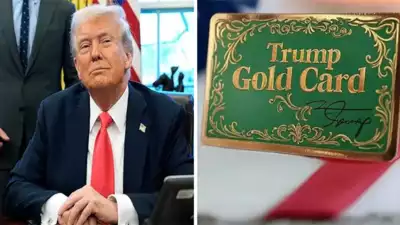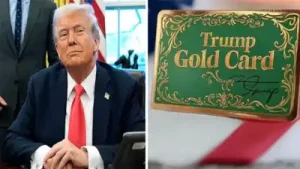In a move already generating widespread discussion and scrutiny, former U.S. President Donald Trump has unveiled a high-priced immigration initiative that would allow wealthy foreigners to purchase U.S. residency—and potentially citizenship—for a fee of approximately $1 million.
Dubbed the “Gold Card” visa, this new program would replace the existing EB-5 immigrant investor visa, which has been in place since 1990. Trump positioned the Gold Card as a premium upgrade to the green card system, stating during a press briefing, “You have a green card, this is a gold card.”
He emphasized that this new visa would not only offer all the privileges of lawful permanent residency in the United States, but also include a route to full American citizenship.
What Was the EB-5 Visa and Why Replace It?
The EB-5 visa program was originally introduced to attract foreign investment into the U.S. economy. To qualify, applicants needed to invest $1 million—or $500,000 in targeted employment areas—into a U.S.-based business that would create a minimum of 10 jobs. In return, investors were granted green cards for themselves and eligible family members.
While the program brought billions of dollars into the U.S., it also became mired in controversy over delays, a lack of transparency, and fraud. Trump’s administration, including his commerce secretary, criticized the EB-5 system as being plagued with “nonsense” and “scams.”
By introducing the Gold Card, Trump claims he aims to eliminate the inefficiencies of EB-5 while significantly increasing the financial threshold, ensuring that only the ultra-wealthy apply.
Who Is Eligible for the Gold Card Visa?
According to Trump, the program is designed for “people with money.” There has been no mention of specific job creation requirements, unlike the EB-5 visa. Instead, the primary qualifying factor appears to be the applicant’s financial capacity and their personal background.
Howard Lutnick, a Trump ally who helped announce the plan, stated that all applicants would undergo strict background checks and would need to be “wonderful, world-class global citizens.”
When asked about the possibility of Russian oligarchs qualifying for the visa, Trump responded, “Possibly. I know some Russian oligarchs who are very nice people.”
Significantly, Trump did not propose a cap on how many Gold Cards could be issued. In fact, he floated the idea of selling up to 10 million visas as a strategy to help reduce the national deficit—a suggestion that has already raised eyebrows among economists and immigration experts alike.
What Will It Cost—and What Are the Perks?
Each Gold Card application will cost around $1 million, making it the most expensive investment-based residency visa in the world, according to Dr. Kristin Surak, a political sociology professor at the London School of Economics.
Despite the high cost, Surak believes there will be strong demand if the process is handled efficiently. “Strangely, Trump is massively underselling what the U.S. has to offer,” she said in a recent interview.
In terms of benefits, the visa will grant holders permanent residency, access to the U.S. job market, and a pathway to citizenship. Under current law, green card holders must wait at least five years before applying for U.S. citizenship. It remains unclear whether Gold Card holders would enjoy a faster track.
Trump has promised to release full details within the next two weeks, coinciding with the program’s official launch.
How Does the U.S. Compare to Other “Golden Visa” Programs?
Globally, many countries have adopted similar “golden visa” or “golden passport” schemes, offering residency or citizenship in exchange for investment. European nations such as Spain, Portugal, and Greece have long provided residency permits through property investments.
In Malta, Jordan, and Egypt, wealthy applicants can purchase full citizenship outright. Meanwhile, Caribbean countries such as Dominica, Grenada, and St. Kitts and Nevis have set their investment thresholds as low as $200,000–$300,000, making them especially popular among high-net-worth individuals seeking visa-free travel and tax advantages.
However, the U.S. tax system is a unique drawback. Gold Card holders, once classified as residents, would be subject to U.S. taxation on their worldwide income. Surak noted that most ultra-wealthy individuals can use complex financial structures to avoid significant tax burdens, but this element may still deter some applicants.
Why Is the Gold Card Visa Controversial?
While investment-based visas can stimulate economic growth, they also raise serious ethical and security concerns. Critics argue that golden visas may provide a backdoor into residency and citizenship for individuals seeking to launder money or evade scrutiny in their home countries. There’s also the broader concern about fairness—namely, that the system favors the ultra-wealthy while other immigrants face years-long waits and stringent requirements.
In recent years, countries like the United Kingdom, the Netherlands, and Greece have rolled back or tightened their golden visa programs in response to growing public and political pressure.
Trump’s Gold Card initiative could face legal hurdles as well. He has asserted that he doesn’t need Congressional approval to implement the program, but constitutional experts argue otherwise. Because Congress is responsible for defining pathways to citizenship, bypassing legislative approval could lead to court challenges.
What’s Next?
The Trump team has announced that more details will be provided within two weeks, including a rollout plan for the visa sales process. As the political and legal debate unfolds, one thing is certain: the Gold Card proposal is set to become one of the most polarizing immigration topics in the upcoming election season.




